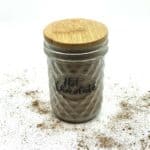As our days get busier, we are far more likely to reach for pre-packaged mixes and other convenience foods to lighten our load and make dinner prep a bit easier. These are some of my favorite homemade kitchen helpers you can make in advance and keep handy for those extra-hectic evenings… or even the non-hectic ones. Work smarter, not harder!
It’s been a cold cold cold couple of weeks here in North Idaho. One day last week saw windchills in the negative 40s. Uff da.
And when the weather gets this cold, a steamy mug of hot *something* is just what the doctor ordered. Hot herbal teas are always on the menu at my house, but every once in awhile, it’s fun to change it up with a rich mug of hot cocoa.
Commercial hot cocoa mixes, while convenient, typically contain high levels of refined sugar (and/or artificial sweeteners), corn syrup solids, GMOs, hydrogenated oils artificial flavors and other highly processed ingredients.
We can do better than that!
It’s super-easy and cost-effective to make your own healthier hot cocoa blends using high quality ingredients. This recipe combines cocoa powder and maple sugar (aka dehydrated maple syrup) with a selection of adaptogenic herbs and mushrooms, which create a lovely, complex flavor in addition to giving the hot cocoa an added health boost.
What's an adaptogen?
An adaptogen is a natural substance, typically derived from plants or fungi, that’s believed to help the body adapt to and cope with stressors (both physical and mental). They have a long history of use in traditional medicine systems, particularly in Ayurvedic and Traditional Chinese Medicine (TCM). Adaptogens are thought to promote balance and resilience within the body, assisting it in responding more effectively to stressors and restoring homeostasis.
Adaptogens work by modulating the body’s stress response systems, including the hypothalamus-pituitary-adrenal (HPA) axis. They may help regulate the release of stress hormones like cortisol, potentially reducing the negative effects of chronic stress.
Some adaptogens are used to combat fatigue and boost energy levels without the jitters or crashes associated with stimulants like caffeine. They may help improve physical endurance and mental stamina.
Adaptogens such as ashwagandha and rhodiola are believed to support cognitive function, memory, and mental clarity. They may also help reduce symptoms of anxiety and depression.
Certain adaptogens, including reishi and astragalus, are thought to enhance the immune system’s ability to defend against infections and diseases.
Some adaptogens exhibit anti-inflammatory properties, which can be beneficial for overall health and may help reduce the risk of chronic diseases.
Ashwagandha
Ashwagandha (Withania somnifera) is a popular herb in Ayurvedic medicine, believed to help the body cope with and adapt to stress. It may modulate the body’s stress response systems, including the hypothalamus-pituitary-adrenal (HPA) axis, which regulates the release of stress hormones like cortisol.
Ashwagandha is often used to reduce symptoms of anxiety and improve mood. It may have a calming effect on the nervous system and help alleviate stress-related symptoms.
Ashwagandha has been studied for its potential to regulate cortisol, the primary stress hormone. Elevated cortisol levels, which can result from chronic stress, may contribute to hormonal imbalance. Some studies suggest that ashwagandha supplementation may help reduce cortisol levels, promoting a more balanced stress response.
While ashwagandha is known for its calming effects, it is also believed to enhance energy levels, stamina and overall vitality. It may help combat fatigue and promote a sense of well-being.
Some studies suggest that ashwagandha may have a positive impact on cognitive function, memory and mental clarity. It is sometimes used to support mental focus and concentration.
Ashwagandha is thought to have immunomodulatory properties, meaning it may help regulate the immune system’s response to various challenges, potentially enhancing immune function.
Ashwagandha contains natural antioxidants that can help protect cells from oxidative damage caused by free radicals, contributing to overall health.
Maca
Maca (Lepidium meyenii) is native to the high-altitude regions of the Andes Mountains in South America, particularly Peru.
Like other adaptogens, maca is believed to help the body adapt to different forms of stress, including physical, emotional, and environmental stressors. It is thought to support the body’s ability to maintain balance and homeostasis.
Maca is often used to boost energy levels, enhance endurance and reduce fatigue. It may help improve physical performance and overall vitality.
Maca root may also have a positive impact on the endocrine system. It’s particularly known for its potential effects on reproductive hormones, which may help alleviate symptoms of menopause and support fertility.
Several studies have found that maca may help alleviate symptoms like hot flashes, night sweats, mood swings and decreased libido that are related to menopause and hormone changes. Maca’s nutrients may act like mild plant-based estrogens that help to stabilize hormones.
Maca is believed to have mood-balancing properties and may help improve mental clarity, focus and cognitive function. It’s sometimes used as a natural remedy for anxiety and depression.
Adaptogenic mushrooms
Several types of mushrooms are considered adaptogens due to their potential ability to help the body adapt to stress and promote overall health and resilience.
Reishi (Ganoderma lucidum) is sometimes referred to as the “Mushroom of Immortality” in traditional Chinese medicine (TCM). It’s believed to support the immune system, reduce stress, improve sleep and enhance overall well-being. Reishi mushrooms contain bioactive compounds called triterpenoids and beta-glucans, which contribute to their adaptogenic properties.
Cordyceps (Cordyceps sinensis) is known for its potential to increase energy, endurance, and athletic performance. It is believed to support the respiratory system, improve oxygen utilization and reduce fatigue. Cordyceps mushrooms contain cordycepin and other bioactive compounds.
Lion’s mane (Hericium erinaceus) is associated with cognitive benefits and is believed to support brain health and mental clarity. Lion’s Mane is believed to promote nerve growth factor (NGF) production, potentially benefiting brain health and memory. Lion’s Mane mushrooms contain compounds known as hericenones and erinacines.
Chaga (Inonotus obliquus) is believed to support immune function, promote overall well-being and have antioxidant properties. Chaga mushrooms contain polysaccharides and betulinic acid.
Turkey tail (Trametes versicolor) is known for its immune-modulating adaptogenic properties. Believed to support immune health, turkey tail potentially offering benefits to cancer patients. It contains polysaccharopeptides (PSP) and beta-glucans.
While not traditionally classified as an adaptogen, shiitake (Lentinula edodes) has adaptogenic potential. Shiitake is believed to support cardiovascular health and is known for its immune-modulating properties. Its beta-glucans may support immune function and overall health.
Maitake (Grifola frondosa) mushrooms are also associated with immune support and overall health. They contain beta-glucans and other bioactive compounds that may contribute anti-tumor effects.
High-quality products such as Real Mushrooms 5 Defenders Powder contain a blend of several of the above adaptogenic mushrooms. I like Real Mushrooms because they focus on the fruiting body as opposed to grain-cultured mycelium and guarantee a certain percentage of beta-glucans. Fruiting bodies are considered the most nutrient-dense part of the mushroom. It accumulates bioactive compounds including polysaccharides, triterpenes and other beneficial substances.
Cocoa
Cocoa powder is kind of a confusing thing to source.
Do we want raw cacao? Fermented? Dutch processed? Regular old roasted cocoa?
What’s the difference?
In a nutshell, it depends on your health goals and preferences.
Raw cacao is often considered the least processed option and retains more of its original nutrient content compared to roasted cocoa powder. It’s the one you’re most likely to find in the health food store, and in some circles, it’s considered to be a “superfood” due to higher levels of antioxidants. Thanks to minimal processing, it does indeed contain more antioxidants, flavonoids and other beneficial compounds than other types of cocoa powder. However, it also contains higher levels of phytic acid, which can reduce the bioavailability of certain minerals like calcium, magnesium and iron.
“Fermented” is another label you sometimes see on cocoa powder. It’s a bit confusing, because fermentation is an integral part of chocolate and cocoa bean production. Most cocoa powder you see on the shelves is going to have gone through a fermentation process as part of the cocoa bean’s natural post-harvest processing — even the raw cacao. Unfermented cocoa is not commonly found in the mainstream chocolate and cocoa product market. Fermentation develops the beans’ characteristic flavors and reduces unpalatable bitterness and astringency associated with raw, unfermented cocoa.
“Regular” cocoa powder is made by roasting the cacao beans. While the roasting process may lead to some loss of heat-sensitive nutrients and antioxidants compared to raw, minimally processed cacao, it also enhances the flavor and aroma while reducing the cocoa’s antinutrients like phytic acid. Roasting may also render the cocoa more digestible and gentler on the digestive tract compared to raw cacao, which may cause digestive discomfort for some.
Dutched cocoa powder is roasted cocoa powder that has undergone a brief alkalization (“dutching”) treatment with an alkaline solution (usually the alkaline salt potassium carbonate) in order to neutralize its acidity. Dutching gives cocoa a darker color and a milder, less acidic flavor than regular cocoa. It’s often described as smoother and less intense. The dutching process can further reduce antinutrients such as phytic acid and, while it may have slightly lower levels of certain beneficial compounds compared to regular cocoa powder, it can still provide a good amount of antioxidants and flavonoids.
So which one do you choose?
Again, the answer is “it depends.” (Clear as mud, eh?)
Personally, I use all of them, depending on the flavor profile I want to achieve. For this recipe, I recommend dutched cocoa powder. I think it tastes the best in hot cocoa and the dutching process improves the cocoa powder’s solubility in liquids, which makes it a natural choice for beverages.


Balanced Bliss Hot Cocoa Mix
5 Stars 4 Stars 3 Stars 2 Stars 1 Star
5 from 1 review
Ingredients
1 1/2 c maple sugar
1 1/4 c dutch-processed cocoa powder
2 T ashwagandha root, powdered
2 T maca root, powdered
1 T mushroom blend like Real Mushrooms 5 Defenders
1 1/2 tsp vanilla extract
1 1/2 tsp ceylon cinnamon, ground
1 tsp cardamom, ground
1/2 tsp high-mineral salt
Instructions
- Combine ingredients in food processor until finely powdered and fully mixed.
- Store in a glass jar with an air-tight lid.
- To serve, combine 3 T hot cocoa mix with 10 oz (1-1/4 cup) of hot milk (or 8 oz hot water + 3-4 T heavy cream), whisking until dissolved.
- Garnish with whipped cream and a bit of shaved chocolate!
Notes
Homemade hot cocoa pairs extremely well with homemade marshmallows!





One Response
Any chance you would or could do the blending and let me buy some to try? I’ve read a lot about mushroom coffee and such, but am in no way near a health food store where I could browse and read up on the individual products. I wouldn’t even know where to begin with shopping online for the individual ingredients – well, except for your affiliates anyway. Thanks